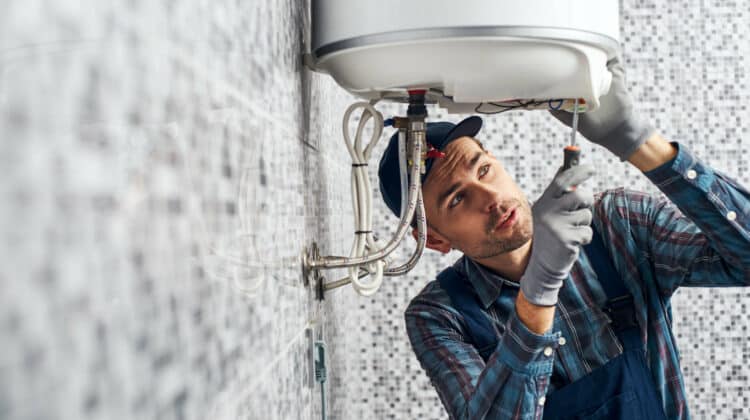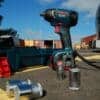It’s never fun to find yourself in the middle of a shower with no hot water, nor is discovering that your water heater has a leak thereby causing your floors to be damaged.
Unfortunately, a broken or aging water heater can leave you without hot water and can potentially cause damage to your property.
Hot showers are one of those things that you take for granted until your hot water heater breaks or malfunctions. If you’ve ever been hit by a burst of cold water when you least expect it, you know how terrible it can be.
Water heaters are an important element of any contemporary home, but are they covered by homeowners insurance?
What follows are important stuff that you should know.
Table of Contents
Is water heater coverage included in homeowners insurance?
Yes, if your water heater was damaged by a risk mentioned in your home’s insurance policy, it is covered. However, homeowners insurance may not cover your water heater in certain circumstances. (See the following section.)
Most home insurance policies include personal property coverage for personal belongings within the home, and your water heater will almost certainly be considered personal property. This covers unforeseeable and unavoidable events such as fire, harsh weather, and criminal activity.
For example, if there was a power surge and it destroyed your water heater, you would almost certainly be insured.
If your broken or damaged water heater is under your basic coverage, your insurance would cover the costs of repair, replacement, and water damage caused by the broken water heater.
When homeowners insurance won’t cover your water heater
The expense of repairing or replacing a water heater that breaks down due to regular wear and tear is typically not covered by most homeowners insurance plans. Most of the time, homeowners are responsible for all appliance maintenance, repairs, and replacements, and this applies water heaters
Home insurance may cover a water heater that has been damaged by an event that is explicitly covered in the insurance policy, such as a fire. Furthermore, damage to a home caused by an unplanned water heater leak is typically covered by insurance.
Because most homeowners insurance policies do not cover appliance repairs, homeowners are usually liable for fixing their water heaters, even if the failure was not their fault.
If your water heater malfunctions for one of the reasons listed below, homeowners insurance will not cover it.
- Carelessness on the part of the owner or neglect to properly maintain the device
- The appliance’s age
- Wear and tear; these are are inevitable
- The water heater has a manufacturing flaw
- Incorrect installation
- Pipes leading to the water heater are causing or having problems
Homeowners may help extend the life of their water heater by providing proper care and maintenance, such as flushing the heater on a regular basis. Water heaters, just like many related appliances, need to be fixed or replaced at some point.
Flood and earthquake insurance are frequently overlooked in homeowners insurance coverage. As a result, if you reside in a flood-prone location, it is suggested that you purchase supplemental earthquake and flood coverage.
Additional equipment breakdown coverage is available from some insurance companies, and it pays for necessary appliance repairs and replacements. Speak with your insurance agent to see if this type of coverage is available to you.
Will a leaking water heater be covered by homeowners insurance?
While the expense of repairing a leaking water heater is unlikely to be covered by a homeowners insurance policy, it may cover the cost of water damage caused by the leak. Although house insurance does not cover flood damage caused by natural disasters, most property coverage will pay to repair damage to your home caused by appliance malfunctions.
Incidental leaks or drains from your water heater can lead to a damaged floor, drywall, and harm to other areas of the home. You might be able to get the repairs paid by filing a claim with your homeowners insurance.
Most insurance firms refuse claims if they feel the water damage was caused by you failing to replace a broken or malfunctioning water heater. You may avoid this issue by having your water heater serviced, properly maintained, and repaired on a regular basis.
What will cover my water heater if my homeowner’s insurance doesn’t?
They include:
- Home equipment warranty — If you have a home equipment warranty for your hot water heater, it will usually cover the cost of replacing the device if it breaks down. These warranties might also aid if the water heater is damaged. Standard homeowner’s plans do not cover general wear and tear on appliances because upkeep is considered the homeowner’s responsibility.
- Maintenance — Maintaining your hot water heater on a regular basis is the greatest way to avoid a disaster. Make sure you understand your home’s insurance policy’s deductible amount as well as its restrictions in both the dwelling and personal property categories.
Are plumbing issues covered by homeowners insurance?
Your water heater is a crucial part of the plumbing system of your home, and problems can sometimes spread beyond it. Because plumbing repairs are typically not covered by insurance, homeowners must hire a plumber to repair their pipes. Frozen pipes aren’t covered by most policies either.
Water damage from burst pipes and other plumbing issues, on the other hand, maybe covered by insurance. If your pipes burst and flood your home, some homeowners insurance plans may cover repairs to the structure.
What type of insurance should I get for my water heater?
Consider purchasing home appliance insurance or equipment breakdown coverage as well. This sort of insurance covers the servicing, repair, and replacement of your household appliances.
Most importantly, be aware of your homeowner’s policy’s provisions regarding your water heater. Read the policies attached and double-check that it covers everything you want them to.
If your heater is close to the end of its warranty, you should think about replacing it. It’s preferable to pay a little extra to have it replaced than to wait for it to break and have to pay for the repairs.
How to Maintain Your Water Heater by Yourself at Home
Warm baths in the early cold mornings are a result of the hard work done by your water heater over time.
So, it is important to care for your water heater by sticking to a scheduled maintenance program that will keep it working for at least 15 years, if not longer.
That said, here are some essential things you must do:
- Place the temperature to be at 120 °F. — For each time you reduce the temperature by 10 degrees, you’ll be saving up to 5% on the cost of energy and this reduces the danger of scalding. Unless the instructions clearly states otherwise, ensure you are keeping a 2-foot distance around the appliance.
- Several times a year, drain out roughly a quarter of the storage tank to take out debris and slit. — Switch off the cold water and empty the water into a bucket using a garden hose connected to the drain valve.
- If the water is still hazy, open the water supply valve briefly to stir up any leftover sediment before draining the tank. — It also improves the machine and makes it work calmly.
- Test the temperature-pressure relief valve at least twice a year by rapidly discharging it two or three times. — Keep a watch out for tiny leaks from the valve when the testing is completed.
- In an event you have to travel, turn the thermostat on your water heater to the vacation part. — This will keep the pilot light lit and still would not heat the water.
How to make your water heater last longer?
The ability to understand the many types of water heaters available can aid in the maintenance of your current system as well as future planning. A well-maintained water heater will be an important feature of your home for many years, despite the original installation price.
So, is water heater coverage included in homeowner’s insurance?
In conclusion, not really. However, you may maintain your machine and budget for the cost of broken equipment by doing so yourself.
But if your machine is reaching its tenth year, it is crucial to have a professional to service your water heater. If after repair, the machine is still not in good shape, then you should consider replacing it before you end up with a flooded basement.





